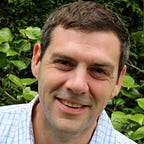Purpose: the “next big thing”
On Monday, I had the opportunity to speak alongside Navi Radjou, in France to promote the French translation of his book “From Smart to Wise” (thanks Dominique). In the themes developed by Navi, I found a lot of connections with those I talked about while outlining my experience of Holacracy at talkSpirit over the last 2 years. Purpose and the meaning given to our actions had a special place. Here’s why I think that the concept of a fundamental/genuine purpose is the next “big thing” for organizations.
Client experience and employee experience are undoubtedly hot topics for organizations at the moment. What we find is that the two are inseparable, and that we can’t develop a successful client experience without having a successful employee experience. That’s natural, well being and the enjoyment of “playing together” come before individual and collective performance.
Let us project a little further ahead in time.
Companies that have failed to develop a successful client experience will no longer be in business, just like those that have been unable to recruit or retain talent. And for the rest? What will be an organization’s arguments for and key factors of differentiation?
I’d like to think that purpose will be the next major challenge. In other words, it will no longer be sufficient to provide a successful experience. In my opinion, the purpose of an organization will need to have something to say, and be one that “speaks”. One that has a clear meaning for your clients and your collaborators, a positive impact on your ecosystem and the ecosystem as a whole. When the quality of the offer is no longer sufficient to differentiate yourself, when the quality of the experience provided is no longer sufficient to differentiate yourself, it’s surely for this purpose that your client or your collaborator will choose you.
What is your project, what is your purpose? What is its value? How will it mark the world? Will it help make our world a better place? Will it contribute to solving one of our planet’s societal challenges?
How do you discover your purpose? Ask yourself why you do what you do, and for each answer, keep asking questions: why? why? why? When you no longer know how to answer this succession of whys, you’ve undoubtedly found the organization’s fundamental purpose, into which you put all your energy.
By asking these questions, do you not find that we’re a long way from the Non Profit and For profit classification that most often differentiates the 2 types of organization we’re familiar with? And that this distinction ultimately has little meaning? Muhammad Yunus, recipient of the 2006 Nobel Peace Prize, has already invited us to consider defining a purpose which makes a contribution to solving some of our world’s major challenges in his book Social Business. It’s interesting to see the movement and announcements by the likes of Google and Facebook these last few months to take action on some of the world’s problems that no State has been able to solve (this is quite normal with the governance and collaboration tools that characterize these organizations).
I’d like to have a resolutely positive vision of what awaits us in the future (foreseeable?). What is the point of an organization tomorrow, what would be the point of this collective intelligence, this connected intelligence, enhanced by the information and communication capabilities that will be ours if its not to serve the world in a meaningful way?
With this in mind, it’s interesting to note the growing importance of this theme of the deeper meaning of our actions in new managerial approaches trialled by so-called “liberated” companies, and even more by those who have adopted Holacracy as an alternative to the conventional hierarchical model. The importance placed on the purpose of each role and the whole organization in the Holacracy model confirms, in my opinion, its value in preparing us for this future where, free of material and consumerist problems, the real questions will be asked with even more urgency: those that drive us, those that move us, those that give meaning to our existence.
